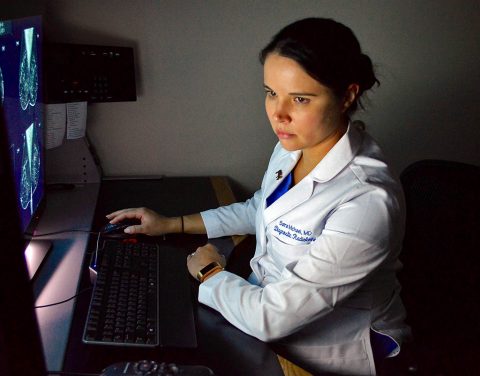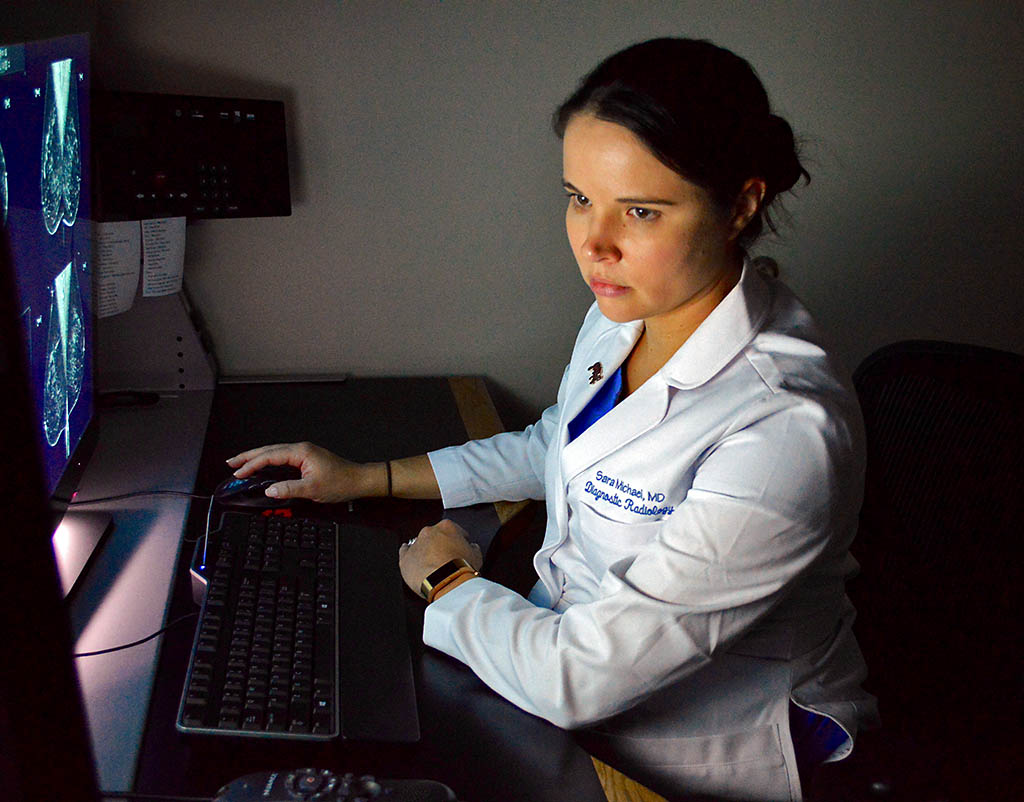Written by Maria Christina Yager
Blanchfield Army Community Hospital
 Fort Campbell, KY – Medical officials recommend women age 40 and older have a mammogram annually to detect for signs of breast cancer.
Fort Campbell, KY – Medical officials recommend women age 40 and older have a mammogram annually to detect for signs of breast cancer.
“Mammography has helped reduce breast cancer mortality in the U.S. by nearly 40 percent since 1990. Annual mammograms can help detect cancer in its earliest stages when it’s most treatable,” said Maj. Sara Michael, a diagnostic radiologist and Chief of Mammography and Ultrasound at Blanchfield Army Community Hospital.

A mammogram is an x-ray that shows the tissue inside of a breast. The x-ray creates an image that a radiologist like Dr. Michael can use to look for abnormalities in the breast.
In most cases a patient is fine and won’t need another mammogram until the following year. Regular mammograms can better help your healthcare team in detecting cancer by giving them a progressive look at your breast over time.
“For every 1,000 women who have a mammogram, about 100 are called back for another look with an additional mammogram or an ultrasound. If the Radiologist sees an abnormality, then a biopsy can be ordered which allows the medical team to collect tissue from the breast for a pathologist to evaluate and determine if cancer is present,” said Michael.
A mammogram can detect signs of cancer well before it can be detected during a self-breast exam, which is the reason women over 40 are encouraged to have the procedure annually. Detecting cancer early improves a woman’s chance of a successful treatment.
Aside from some skin cancers, breast cancer is among the most common cancer affecting women. More than 200,000 cases are diagnosed annually.
Women over age 40 who receive care from BACH and have no current health issues can call directly to schedule their mammogram. Patients under medical care at BACH for a current health issue should speak with their physician or provider for a referral. Women over age 40 enrolled in TRICARE, who receive their medical care off post can ask their physician or provider for a referral to receive a mammogram at BACH.
According to the TRICARE website, women beneficiaries over 40 are authorized a mammogram annually. Additionally, younger patients with certain risk factors can ask their healthcare physician or provider for a referral and use risk models to determine if additional screening measures are needed.
Dr. Michael recommends not having a mammogram the week before or during your period. Breasts may be tender or swollen during that time causing discomfort during the procedure. Once a mammogram is scheduled, Dr. Michael offered the following tips:
- Don’t apply deodorant, perfume, or powder before your mammogram because these can show up as white spots on the X-ray.
- Dress comfortably in a top and bottom so you can easily undress from your waist up for the mammogram.
- Plan to spend about 30 minutes in the clinic. While the mammogram takes just minutes, patients should allow time to complete paper work.
Finally, mammograms work best when they can be compared with previous ones. This allows the radiologist to compare them to look for changes in your breasts.
If you have had a mammogram at another facility, you will need to fill out the necessary forms to have those images mailed to BACH. Patients who have had a mammogram at BACH and are transferring to another installation can visit the clinic to get a copy of their mammogram images to give to their new provider.
“Patients can fill out some paperwork and request a CD before leaving the department and the CD will typically be ready in 48 hours. While another medical treatment facility should be able to transmit the images electronically, I still recommend having a CD on hand since plan B is always advised,” said Dr. Michael, adding that BACH will also accept mammogram images for incoming patients.



